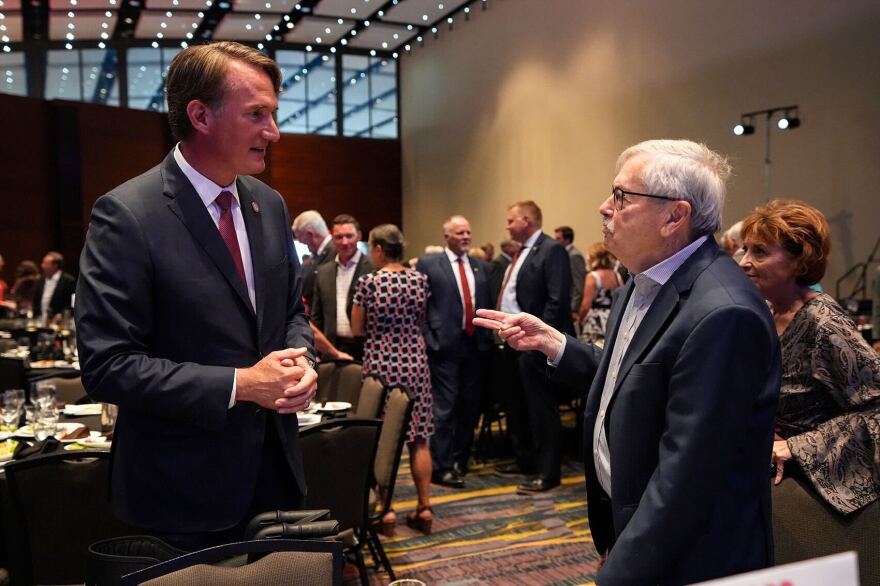Virginia Gov. Glenn Youngkin said he supports Iowa’s position as first in the Republican presidential nominating process at an Iowa GOP fundraiser in Des Moines Thursday evening, raising speculation about a possible run for president in 2028.
Republican Party of Iowa Chairman Jeff Kaufmann asked Youngkin if he likes the GOP presidential nominating system that starts in Iowa. Youngkin said, “Absolutely.”
“The beginning of the nomination process starts with incredibly informed voters,” Youngkin said. “You see, the difference in the way that the caucus system works and the way a normal primary works — you all know this — is it is a moment to fully understand issues, candidates and what that candidate can do. And so often, primaries are a day when someone shows up and just pulls on a lever because a friend whispered in their ear, ‘Vote for them.’”
He said national Democrats “made a massive mistake” by removing Iowa’s first-in-the-nation status in that party’s nominating process.
“Well, that is exactly the answer I wanted,” Kaufmann replied.
Speaking to reporters after the event, Kaufmann said Youngkin has not told him if he will run for president in 2028. But he said Youngkin’s visit will help the rest of the country understand that the Iowa caucuses should stay first in the nation.

Kaufmann said it’s not too early to hold events in which Iowans can hear from possible presidential candidates.
“Iowa has proven again and again and again that we are the right place to start on behalf of the entire nation,” he said. “So no, it is not too early. Fact, I’d like to see it ramp up. I hope you get about four or five more before the end of the year.”
U.S. Sen. Ted Cruz of Texas, who won the Iowa caucuses in 2016, and U.S. Sen. Eric Schmitt of Missouri are scheduled to speak in Iowa at a fundraiser for Attorney General Brenna Bird next month.
Kaufmann did not say which other possible presidential contenders are planning to visit Iowa this year.
Youngkin introduces himself to Iowans, talks education policy
Youngkin said he grew up in “a very normal American family.” He said his mother had the biggest impact on his life, and he described how she handled the challenge of his father losing his job.
“It was at a time where I was just going into eighth grade, and I learned two big, big lessons: Number one, family is everything through ups and downs,” Youngkin said. “And second of all, there is dignity in work. Because I went and got a job.”
He said his mother also taught him that “God gave you two ears and one mouth,” and that he should use them proportionately.
“And I think that’s at the heart of what I think public service is all about,” Youngkin said. “A lot of people come into public service, and they spend so much time broadcasting. And I will tell you, my experience is, when we start receiving, then we are a better public servant.”
Youngkin was previously the co-CEO of a private equity group. He said he had never campaigned for any elected office before, but he “had a calling” that he should quit his job and run for government office.
Youngkin was elected governor of Virginia in 2021, the first Republican elected to a statewide office there in 12 years. He said he ran on education policy and elevating “parents’ rights,” as pandemic-related school closures and mask requirements became political flash points.
“The clear choice was between a candidate who thought parents should have no say in their child’s education, and my recognition that there is a fundamental right for parents to make decisions with regards to their child’s upbringing, their care and their education, and we are going to make sure we stand for it,” Youngkin said.
He said he has since prioritized other policies to expand options for children’s education, including creating lab schools, which are public schools that specialize in training students for specific careers.
Youngkin said his goal is to enact universal taxpayer-funded accounts to pay for private school tuition, similar to Iowa’s education savings accounts.
He is also scheduled to speak at a major Republican event in South Carolina next month, another early state in the presidential nominating process.


